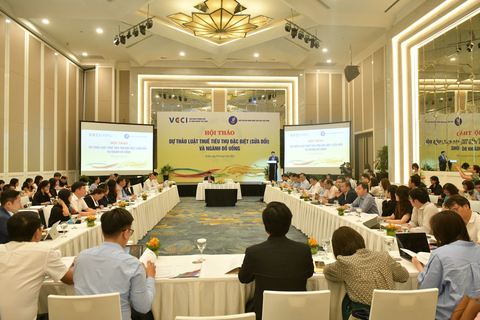
Participants attend a workshop to collect experts’ opinions for the draft of the amended Special Consumption Tax Law and the beverage industry in Hà Nội on August 8. — Photo baotintuc.vn
A workshop to collect expert opinions for the draft of the amended Special Consumption Tax Law and the beverage industry led to plenty of controversies.
The event was jointly organised by the Vietnam Confederation of Commerce and Industry (VCCI) and the Vietnam Beer - Alcohol - Beverage Association (VBA).
The meeting, held on August 8 in Hà Nội, gathered opinions from the perspective of the beverage industry on the revised Special Consumption Tax Law project that the Ministry of Finance has drafted with many important amendments.
For the beverage industry, businesses in the chain of production, business and consumption of goods and services are directly affected by the proposed adjustment of the law, with a proposal to increase tax rates every year until 2030 for wine and beer products.
The drafting agency proposed two options for increasing tax rates on alcohol and beer products:
Option one is that in 2026 when increasing the tax rate higher than five per cent of current regulations so the selling price of products will increase by 10 per cent compared to 2025.
Option 2 is also in 2026 when increasing the tax rate higher than 15 per cent of current regulations, the selling price of products will increase by 20 per cent compared to 2025.
In addition, the draft proposes adding beverage products with sugar content above 5g/100ml according to Vietnamese Standards will be subject to special consumption tax.
Agreeing with the viewpoint of increasing special consumption tax, Nguyễn Đức Lê, Deputy Director, Department of Market Management Operations, General Department of Market Management (Ministry of Industry and Trade) said that in 2023, the number of violations related to alcohol and beer was 102 cases, of which, fines amounted to more than VNĐ1.4 billion.
In the first six months of 2024 alone, 153 violation cases related to alcohol were handled with fines of about VNĐ1.5 billion, 38 cases related to beer products were handled with a fine of VNĐ587 million.
Speaking at the conference, VBA chairman Nguyễn Văn Việt said public opinion was very interested in the proposal to increase special consumption tax. The proposal not only has a major, direct impact on businesses producing and trading alcohol, beer and soft drinks but also affects related industry chains, labour and social security.
“The beverage industry has an economic role and contributes nearly VNĐ60 trillion yearly to the State budget. In recent years, the industry has encountered many difficulties due to the COVID-19 pandemic, world conflicts and restrictive management policies. Beverage businesses have tried to find ways to overcome difficulties by many solutions to increase resilience, stabilise production and keep jobs for workers," said Việt.
However, businesses are still facing many difficulties, leading to restructuring, downsizing production, closing factories and cutting labour. As a result, all commercial systems, restaurants, services, transportation and input supply chains are affected.
“We support the State's policy on increasing taxes, however, for the two options for consultation this time, it is necessary to consider and evaluate carefully and have a roadmap, consider delaying the application date and the implementation level and reduce the increase in tax rates for the alcohol and beer industry, based on a comprehensive assessment of the impacts in real conditions in Việt Nam,” said Việt.
"Regarding sugary beverages, there is currently a lot of debate about scientific evidence related to the subjects of application, the main causes of overweight and obesity and non-communicable diseases. Therefore, we should consider not adding this item to the subject of special consumption tax during this period. It is necessary to thoroughly and comprehensively evaluate and consult experts and scientists with this new product proposal," Việt proposed.
According to BIDV Chief Economist and Director of BIDV Training and Research Institute Cấn Văn Lực, the average profit of the entire beverage industry continues to decrease (in 2021 down 12 per cent, in 2022 down six per cent, in 2023 down 10 -12 per cent compared to the previous year).
“With the impact of the revised special consumption tax law, it may increase State budget revenue in the short term, but in the medium and long term, it will reduce consumer demand, reduce revenue and corporate profits, thereby reducing VAT and corporate income tax collection. Thus, the overall increase or decrease in tax revenue is unclear,” said Lực.
Therefore, Lực proposed that a proper and comprehensive evaluation needs to happen in order to chose the best option for Việt Nam's economic context, harmonising interests and feasibility for the State, businesses and consumers.
At the same time, it is necessary to have a full impact assessment, with a scientific and practical basis and calculate appropriate and feasible tax levels, along with timing and roadmap for tax increases.
Chairwoman of the Vietnam Tax Consulting Association Nguyễn Thị Cúc said that increasing tax rates on alcohol and beer products is necessary and consistent with the Party and State's policies. However, it is necessary to aim for a special consumption tax policy that harmonises goals and is appropriate to the specific context.
Increasing the special consumption tax at a high level and continuously may not be as effective as the target of the special consumption tax.
Increasing taxes increases selling prices and can limit alcohol production, however, it does not necessarily achieve the goal of reducing alcohol consumption, because higher taxes can lead to an increase in smuggled goods. High income consumers will turn to drinking imported wine and beer, according to Cúc.
“We should consider a plan to extend the tax rate increase with a roadmap so that businesses have conditions to build plans and transform production. For example, the first year the tax rate will increase by 5 per cent, the following years the tax rate will increase over a period of several years instead of one year," suggested Cúc. — VNS